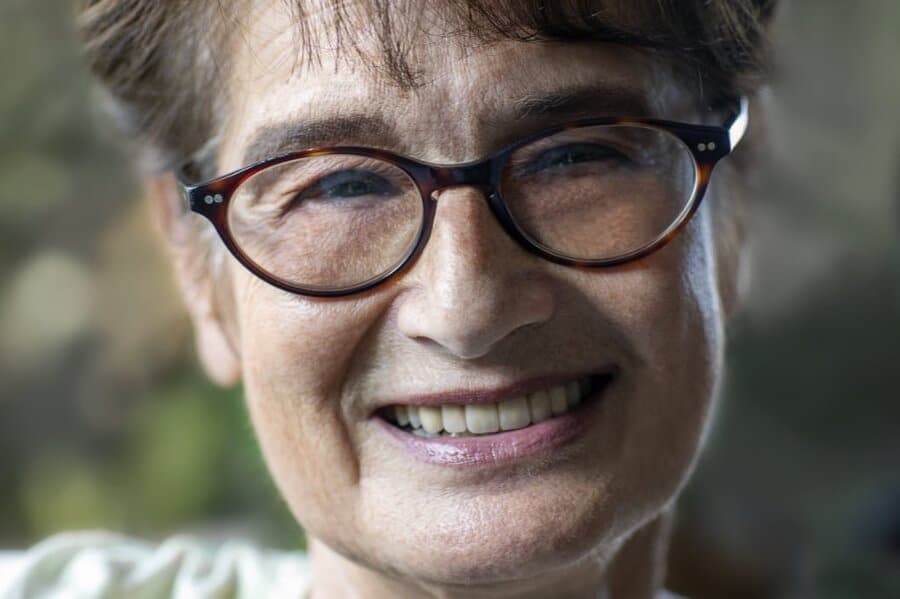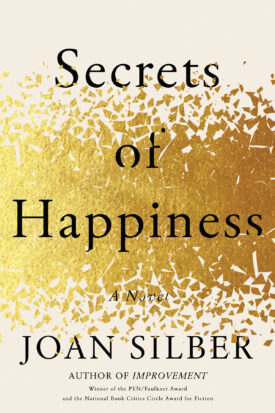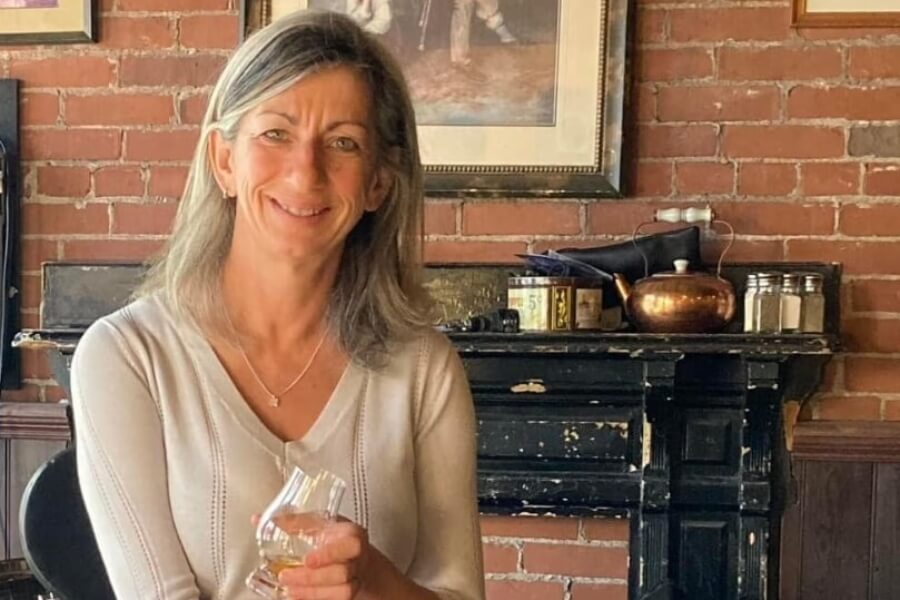Editor’s Note: In April 2019, NextTribe writer Sheila Weller wrote this interview with fiction writer extraordinaire Joan Silber. The winner of the PEN / Faulkner Award and National Book Critics Award for Fiction, Joan was being considered perhaps America’s greatest living fiction writer, a distinction it took her 38 years to richly earn.
Joan and Sheila had known each other, off and on for decades—from their days as waitresses in downtown Manhattan’s “hip” restaurants—and their background colored this conversation. On Thursday, June 3, Sheila and Joan will be back in conversation on NextTribe, about surviving the pandemic year and, mainly about, Joan’s latest and ninth novel, Secrets of Happiness, which was recently released to (deserved) enormous praise. Ann Patchett said, “It would be impossible to overstate how good this book is.” Kirkus Reviews called it “a novel in stories from the master of form.” Publishers Weekly termed it a “mesmerizing story of love, lies, and the consequences of betrayal” which “brims with heart and intelligence.”
The New York Times reviewer said, of its very-Silber-like implementation of multiple narrators telling different aspects the same story, that “Silber illuminates those invisible fissures and inexplicable distances that we sense, however dimly, make up our shared lives with others as much as our formal connections and open battles. A mere bit player in one installment turns into the bête noire of the next, while the jerk grades in to a redeemer. Roundedness is what Silber is after, the insight that comes with a change in perspective, a god’s point of view. I never wonder more at how little we know about how greatly we factor in other people’s lives than I do when reading Silber at her best. She aims, in increments, at the ecstatic.”
On the 3rd we’ll talk about the novel, Joan’s life, and what she’s working on next. Here’s what she told us a couple of years ago.
***
The other day, I was happy to open my copy of Joan Silber’s sixth book The Size of the World, which I had bought at a reading she gave in December 2008, and to see what she’d written: “To Sheila, who has known me so long. With much love, Joan.”
I smiled at that and remembered our long history. Joan and I met in the early ‘70s when it was far cooler to be a foxy waitress at a hipper-than-hip downtown Manhattan restaurant than to have a “straight” job. She and I, like so many very young women, hung a “See ya in a few years” sign on our supposedly destined futures. We then slid from waitressing into writing. But, while I did magazine work and nonfiction books, Joan was the “serious” (my quotes) writer. I admired the perfectionism, innate bohemianism (I’d been a wannabee bohemian), and integrity that characterized her as a novelist and short story crafter, year after year after year. One of her former students at Sarah Lawrence—Joan’s alma mater and where she’s taught since 1985—said recently that Joan liked to quote the great short story writer Grace Paley: “In order to sustain ourselves, writers must have a hunger to write.”
Now is the moment to appreciate that she is, here in our midst, our country’s own Alice Munro.
Well, Joan had and has that hunger. The work was what mattered. Her books are astonishingly good. My heart had quickened when I read the first of her now-eight works of fiction, Household Words. The milieu and circumstances—suburban New Jersey in the 1950s; a mother and two children—are similar to the one she grew up in. Reviewing it in Ms. magazine, I wrote that it was “a brave, wise, quite nearly heartbreaking book.” My compliment would, over the years, be happily drowned out by the voices of distinguished fiction writers, leveling at Joan’s work some of the most sterling praise ever awarded to any writer. Years ago, when she won the PEN Hemingway Award for it and was feted at a ceremony in Boston, Joan, who is usually indifferent to celebrities, called me at 3 a.m. and blurted out: “Guess who I just sat next to at the dinner? Jackie Kennedy!”
Joan had a way of seeing through people’s imperfections to their characters, so when, for example, I once had a big fight with my then-boyfriend-now-longtime husband, I walked the many blocks, barely after the crack of dawn, to her place for considered and understated counsel.
Over the decades we’d get together for a meal now and then, or a trip to the country, and I’d go to holiday parties at her loft in the then-funky (now chic) NoHo section of Manhattan. Although buoyant (my husband calls her the most “charming” woman we know), there was always a dignity and generosity about Joan. She never seemed resentful of more famous writers. She quietly piled up literary awards and was long- and short-listed for the most major ones, but she didn’t get feted with the jazzy, household-name-and-movie-adaptations treatment that many less critically lauded fiction writers were enjoying. Amanda Vaill, the editor of Joan’s first two books, Household Words and In The City, puts it this way: “Joan is someone whose voice is so quiet that sometimes people don’t listen. There are fiction writers who are very highly regarded but they’re `look at me’ writers. Joan is not one of them.”
In the past two years—in an upswing that started 13 years earlier—everything Joan methodically worked for, for its own sake, has been rewarded. Her latest novel is called Improvement. Its chapters are interlocking stories that range from Turkey to a modest Manhattan neighborhood to the jail on Rikers Island and feature, as Joan’s books often do, women who are matter-of-factly unconventional. The book has won killer reviews. “An everyday masterpiece,” says Newsweek; “a novel of richness and wisdom and huge pleasure,” the New York Times Book Review raved. The Wall Street Journal says the book is “exceptional … vibrant … hopeful and beautiful.” Improvement also won the 2018 PEN/Faulkner Award for Fiction and the National Book Critics Circle Award, and Joan received the PEN/Malamud Award for Excellence in the Short Story—three of the most prestigious awards in fiction.
And, as if prefacing that coup, a year and some months ago, critic Charles Finch wrote a passionate exhortation in the Washington Post. Referring to the Nobel-Prize-winning Canadian fiction icon, it was headlined “Joan Silber is America’s own Alice Munro.” Speaking loudest about what others had noticed, Finch went on: “It feels vital to love Silber’s work, which has been too little loved, too little mentioned, beyond a small readership that seems to be composed mostly of writers. … [N]ow is the moment to appreciate that she is, here in our midst, our country’s own Alice Munro.”
To Save Your Spot at Our Interview with Joan Silber on Thursday, June 3rd, Click Here
Finally Reaping the Rewards
“It’s a happy time for me,” Joan said when we had drinks the other night. We hadn’t seen one another in about five years, so it was good to catch up. “It’s a very nice time in my life. I’m enjoying all of this immensely. I have what I wanted: being acknowledged for my work. Commercial success wasn’t what I was after,” she said—a sentiment that, if you know Joan, you know is honest.
“The most exciting night for me was the National Book Critics Circle Award,” she said. It took place almost exactly a year ago. “I didn’t expect to win it,” Joan says. After all, among the nominees in her category were Alice McDermott and Arundhati Roy, and all of her competitors had major publishers while Joan was published by the indie Counterpoint. She brought friends and her editor to the awards ceremony. “When they called my name I heard all this shouting. It was very thrilling!” In officially announcing her win to the media, the Critics Circle called Improvement “a dazzlingly inventive and deeply compassionate novel whose multiple storylines reveal shared human moments of love, loss, fate, guilt, and redemption.”
Fools was, like all of Joan’s book, about humanity and passion and the role time plays in life.
Joan’s first four books were written in the third person and were slightly autobiographically tinged. After Household Words, she wrote In The City, published in 1987, about a young girl moving from New Jersey to Manhattan in the 1920s, full of bohemian longing and determined to break moribund conventional dating and sex rules—as our own cohort would also do in the halcyon late 1960s. Her third book—this time short stories rather than a novel—In My Other Life, which was published in 2000, completely nailed the waitress-and-bartender, kind-of-maybe-drug-doing world of those years in which I first met Joan. The New Yorker ran one of the short stories.
I was surprised to learn from her that it was hard for her to get that book published—even though she’d gotten such powerful exposure in the New Yorker. “This was the worst time for me. The gap between [the publication of] my second and third books was thirteen years,” a seemingly inexplicable period of turn-downs. But In The City had not sold well, and there were changing trends in fiction.
At midlife by then, Joan—born Jewish—became interested in Buddhism and concentrated on consciousness and empathy. During those years that encompassed the height of the AIDS epidemic in New York, she became a “buddy” by way of the Gay Men’s Health Crisis to an AIDS sufferer. Both pursuits gave her a larger perspective. Compared to her friend with AIDS, “small problems looked smaller,” she says. “I sometimes tell people that the big ideas of Buddhism are `Get over yourself’ and `Don’t worry; it won’t last long; nothing does.’ I’m certainly less anxious for having absorbed those ideas.”
Gaining Traction Again
The empathy she felt for people with AIDS showed up in her next book, 20o1’s Lucky Us. In it, a wild young female painter, Elisa, falls in love with a Gabe, a gentle introvert 15 years older; both of them used to take drugs. Joan’s work makes unapologetically clear that this was part of our generation’s history, and her male characters are often outliers from the cliché of the upstanding high-achieving hero. Just before they plan to marry, Elisa finds out that she is HIV positive, and she briefly runs back to a destructive former love. Elisa’s AIDS is described with close-to-first-hand pain—Elisa knows that “all the moistures of my body were not simple anymore, that my leaking female self was slick with danger.” She reunites with Gabe, and they make peace with the compromised health that will inform their marriage.
Kirkus made the point that others have made about Joan’s writing: It is “refreshingly unsentimental” and possessed of “a modest intimacy that brings her characters to heartbreaking clarity even as she remains true to the ambiguities that plague every life—and love.” As her editor Amanda Vaill had noticed early on, “Joan means everything she is saying. Her perceptiveness is so huge, but she has this very calm way of seeing sometimes the most outrageous things and she never sensationalizes anything.” Lauren Groff (a writer Joan herself admires) has said, “I love all of Joan Silber’s work for her … ferocious and searching compassion. Her books make me forget the chaos of life around me.”
At first because of her Buddhism, Joan began traveling to Asia for stretches of time every year—an important, permanent practice—and three of her next four books take us all over the world. They span decades and sometimes centuries and places. She started writing these “rings of stories,” with a minor character in one story turning into a major character in another. She came to agree with the late art critic and writer John Berger that “Never again will a single story be told as if it’s the only one.”
Her books have the power to make us question our criteria for admiring people.
Her book Ideas of Heaven, published in 2004, moved from 15th-century Venice to missionaries in China to a young man who is spiritually saved by Buddhism today. The book’s short-listing for the National Book Award was the beginning of Joan’s vault from a writer’s writer to wider-known literary eminence. but it came at an ironic price: All the short-listed nominees that year were women, all were women who lived in New York, and all were far more critically than commercially successful. Three of the five, including Joan, were midlife. This caused grumbling among some people who thought that the nominees were too similar and too parochial.
The crabby reaction “was sexist, absolutely,” Joan says now. But she and her fellow nominees (Lily Tuck, Sarah Shun-lien Bynum, Kate Walbert, and Christine Schutt) bested the snobbish naysayers by, effortlessly, becoming friends. When, among the five of them, Lily Tuck won, she invited the others on the Charlie Rose Show with her, an experience Joan loved. Sisterhood was powerful! But, Joan notes, 2004 was the last year that an all-female group was chosen as finalists for the National Book Award.
Joan’s next book, 2008’s The Size of the World, spanned from Vietnam to Thailand to Mexico to Sicily and back to America. In 2013, she followed that with Fools, which started with a long story on 1920’s idealistic radicals—Dorothy Day, Sacco and Vanzetti—and wended its way across the world and back to Occupy Wall Street. Fools was, like all of Joan’s book, about humanity and passion and the role time plays in life. Long-listed for the National Book Award, it was called “astounding … beautiful, intricate, and wise” by the New York Times Book Review.
Read More: Carole King Talks (and Sings) about Coming Together
Looking Ahead
Joan is about two-thirds finished with her ninth book, tentatively called Secrets of Happiness, which contains more linked stories, including one about a woman who finds out her husband has another family. The people in Joan’s stories are never cliché. She once told me, years ago, that she would never go for a man who wasn’t distinctive in sensibility—and, implicitly, a user of the distinctiveness in a creative calling.
Joan says the idea of generosity is more important to her as she gets older.
The main male character in Improvement, Boyd, has been in jail and then goes off on a cigarette-smuggling caper, “but he’s a good guy,” Joan insists, zeroing in on something deeper and more offbeat than his circumstances, a calmly stubborn focus that has given her books the power to make us question our criteria for admiring people. “I’m trying now for [creating] moments in which we see people differently,” beyond easy formulations. As for waiting a long time to become widely heralded, and seeming unperturbed by the time it took, Joan is philosophical. “We all say we’re less arrogant now than when we were young, and the idea of generosity certainly is more important to me as I get older. When I meet people who lack generosity, I think: You really haven’t developed that much, have you?”
And that, to Joan Silber, is the far, far bigger shame than not becoming famous young.
Read More: The Eve Babitz Resurrection and Other “Forgotten” But Cool Women Who Deserve a Revival
***
Sheila Weller is the author of seven books (three of them New York Times Bestsellers), including Carrie Fisher: A Life on the Edge and Girls Like Us: Carole King, Joni Mitchell, Carly Simon—and the Journey of a Generation, which Billboard magazine recently named #19 of the best music books of all time. She has been writer of major features for Vanity Fair, a recent longtime senior contributing editor at Glamour, a has written for the New York Times Opinion, Styles and Book Review and for just about every women’s magazine in existence. She has won 10 major magazine awards.
A version of this piece was originally published in April 2019.






















0 Comments